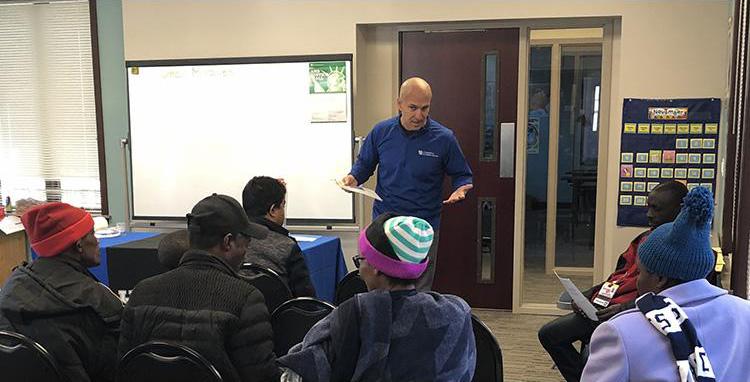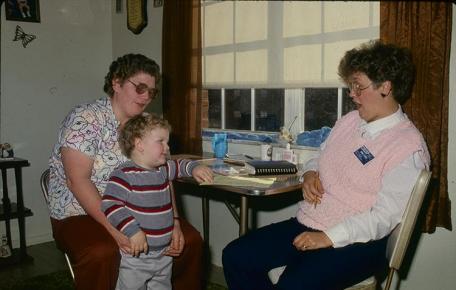
The Expanded Food and Nutrition Education Program is celebrating a half century of teaching low income families how to eat healthier while stretching their food dollars.
In Kentucky, the U. S. Department of Agriculture program is administered through the University of Kentucky Cooperative Extension Service and is particularly focused on helping low income, limited resource families with young children improve their nutrition and health outcomes. In 2018, its program assistants reached more than 8,100 Kentuckians and 8,775 young people with its educational programming.
“EFNEP has been really great at teaching people how to budget and plan meals to improve their nutrition and spend their food dollars wisely,” said Liz Buckner, UK extension specialist with the Nutrition Education Programs in the UK College of Agriculture, Food and Environment.

An archive photo of former Boyd County EFNEP assistant Donna Powers working with one of her families.
The program has an incredible success rate. In 2018, 95% of the program’s adult participants said they have healthier eating habits and 93% reported an increase in food security because of the program. The majority of clients improved their food safety practices, and 80% of adult participants now understand and use food labels to make wiser food choices.
“One of the things that has made Kentucky’s program so successful is that we hire program assistants who can relate to the audience that we serve,” said Debra Cotterill, director of the Nutrition Education Programs. “Our program assistants have compassion for their clients and know where the local resources are to help those families.”
EFNEP focuses not only on teaching families food preparation skills but actually putting those skills into practice as lifestyle changes.
“This past summer, I saw one of my former students who is now in her second year of college, and she told me that she is still using some of the recipes that I taught her when she was younger,” said Juanita Herron, a longtime EFNEP program assistant in Marion County.
Many times, EFNEP assistants’ work leads to partnerships with other organizations who that are working with the same clientele.
“In utilizing these resources and letting our clients know we want to help them, they are more receptive to the educational programs that we offer and new ideas about foods, budgeting and healthy eating,” said Velma Mullins, EFNEP assistant in Laurel County.
The program has changed over the years to meet clients’ needs. In 1969, program assistants went from home to home visiting their clients, and people found out about the program mainly by word of mouth. The program also had great success with gardening projects and a mobile educational bus over the years. Today, the program still gets referrals by word of mouth and by working with local organizations, but it is much more technology friendly. EFNEP offers a newsletter, social media page, a blog and a soon-to-launch website, to give clients a 24/7 connection to the program and the university. Program assistants also encourage their participants to use the UK-developed Fitblue app, a fitness and nutrition tracker that also provides the location of local food banks and farmers markets.
“EFNEP is able to leverage the Cooperative Extension Services’ presence in all 120 Kentucky counties and CAFE’s network of knowledge and extension specialists to increase the number of clients we can serve, provide high quality educational materials and make the program a good value for Kentucky taxpayers,” Cotterill said.
